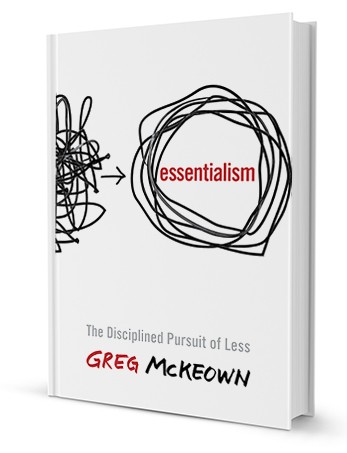Book Reviewed by Diane Byington Ph.D. – Essentialism – The Disciplined Pursuit of Less by Greg McKeown
At social occasions I hear a similar complaint repeated over and over: “I’m too busy. I’ve got to find some way to cut down on some of my activities.” I recommend the new book Essentialism, by Greg McKeown, as a way to decide which activities to cut and which to keep.
According to McKeown, Essentialism is not about how to get more things done; it’s about how to get the right things done. It doesn’t mean just doing less. It’s about doing only what is essential so you can operate at your highest point of contribution.
Throughout the book McKeown contrasts the thinking of the “Nonessentialist” with the “Essentialist.” The Nonessentialist thinks: “I have to,” “It’s all important,” and “How can I fit it all in?” The Essentialist, on the other hand, thinks: “I choose to,” and “Only a few things really matter,” and “What is the trade-off?” By moving toward one’s highest priorities, while turning down other opportunities, the Essentialist can develop a life that really matters and that brings joy in the journey.
Some of the quotes I appreciated include: “If you don’t prioritize your life, someone else will.” “The ability to choose cannot be taken away or even given away—it can only be forgotten.” “If it isn’t a clear yes, then it’s a clear no.”
McKeown’s ideas aren’t new, but they directly address this reality of “faster and faster” that seems to be taking us over. Essentialism is a version of “All I needed to know I learned in kindergarten.” We all know we need to get enough sleep (yes, there is a chapter telling us we need eight hours of sleep a night), and that we need to prioritize, and that it’s important to set boundaries and say “no” to things that aren’t essential. We know these things, but how many of us do them consistently? Probably not many. Life and its demands continually creep in. And that’s why it’s important to have books such as this one that remind us to pay more attention to what is essential in our lives. That it’s not only okay to do so, but it will make us more productive employees, family members, and human beings.
One of my favorite chapters is “Clarify,” which is about creating mission statements for teams. The mission statements can’t be “pretty clear.” Instead, they need to be “really clear” to everyone on the team. McKeown says, “You can train leaders on communication and team-work and conduct 360 feedback reports until you are blue in the face, but if a team does not have clarity of goals and roles, problems will fester and multiply.” It reminds me of Phase I of the Task Cycle®.
When teams lack clarity of purpose, the people on the team either play politics (become overly focused on winning the attention of the manager), or they become leaderless (people pursue things that advance their own interests, with little awareness of how their activities contribute or derail the long-term mission of the team as a whole).
In order to develop a statement of purpose, the most essential question the team must answer is: “If we could be truly excellent at only one thing, what would it be?” The next thing to consider is: “How will we know when we have succeeded?” When you can write down both of these answers in clear language, the mission statement is complete.
Every chapter has a similar structure, drilling down into what is essential in work and life and suggesting ways to achieve the essential, while at the same time eliminating what is not essential.
Daniel Pink says of this book, “Do you feel it, too? That relentless pressure to sample all the good things in life. To do all the ‘right’ things? The reality is, you don’t make progress that way. Instead, you’re in danger of spreading your efforts so thin that you make no impact at all. Greg McKeown believes the answer lies in paring life down to its essentials. He can’t tell you what’s essential to every life, but he can help you find the meaning in yours.”
I will continue to recommend this book, and to consult it myself. McKeown has created a roadmap for how to do “less but better.” It’s something we can all use.
— Diane Byington is a writer and coach who consults with The Booth Company.

